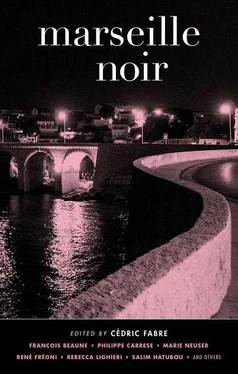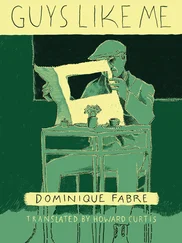Cédric Fabre - Marseille Noir
Здесь есть возможность читать онлайн «Cédric Fabre - Marseille Noir» весь текст электронной книги совершенно бесплатно (целиком полную версию без сокращений). В некоторых случаях можно слушать аудио, скачать через торрент в формате fb2 и присутствует краткое содержание. Год выпуска: 2015, Издательство: akashic books, Жанр: Крутой детектив, на английском языке. Описание произведения, (предисловие) а так же отзывы посетителей доступны на портале библиотеки ЛибКат.
- Название:Marseille Noir
- Автор:
- Издательство:akashic books
- Жанр:
- Год:2015
- ISBN:нет данных
- Рейтинг книги:5 / 5. Голосов: 1
-
Избранное:Добавить в избранное
- Отзывы:
-
Ваша оценка:
- 100
- 1
- 2
- 3
- 4
- 5
Marseille Noir: краткое содержание, описание и аннотация
Предлагаем к чтению аннотацию, описание, краткое содержание или предисловие (зависит от того, что написал сам автор книги «Marseille Noir»). Если вы не нашли необходимую информацию о книге — напишите в комментариях, мы постараемся отыскать её.
Marseille Noir — читать онлайн бесплатно полную книгу (весь текст) целиком
Ниже представлен текст книги, разбитый по страницам. Система сохранения места последней прочитанной страницы, позволяет с удобством читать онлайн бесплатно книгу «Marseille Noir», без необходимости каждый раз заново искать на чём Вы остановились. Поставьте закладку, и сможете в любой момент перейти на страницу, на которой закончили чтение.
Интервал:
Закладка:
“What will you give me if I talk?” he asks.
“We lay everything on your friend, the interim president, and you get the hell out of here and go far, far away. I don’t know you and you don’t know me.”
He peers at me and asks: “How do I know you’ll keep your word?”
“Hayi, wemkomori mi mkomori na mbe kali mbe!” (Hey, you’re Comorian and I’m Comorian. An ox never eats an ox.)
The fact that I spoke in his native tongue reassures him. So he starts talking: “Radhia was a very beautiful girl. After she got out of school, she couldn’t see herself earning pennies at some boring office job. I recruited her. She went on lots of missions. When we had to kill the president, I sent Radhia to seduce him because no one was ever able to resist her charms. When he was in Marseille, the president invited Radhia to lunch, just him and her, at a restaurant on the Vieux-Port, where the man who is our interim president had been a dishwasher. Then, like in the movies, she poisoned the president’s coffee while he was out answering a phone call from one of our accomplices. And that was that.”
“Classic. So if he was poisoned here, how come he didn’t die in Marseille?”
“No way. The president of the Comoros dies suddenly in France, can you imagine what a diplomatic mess that would make? We simply used a poison that doesn’t take effect right away. After accompanying the president to the airport, Radhia was filled with remorse. She came to see me and told me she wanted to end all this, find the love of her younger days, ask for forgiveness, get married. But she knew far too much, especially state secrets. It wasn’t safe to let her live. So I put out a hit on her, and the next morning two men on motorcycles took care of her.”
“Give me the killers’ names.”
“You wasted the first one in the Comoros and you just killed the second. That’s the whole story. Now it’s your turn to keep your word.”
I pick up my cell and say, “Oh shit, my phone recorded the whole thing. You’re screwed. By the way, your boy the fish scaler was dismissed from his post. Lieutenant Bam read him a long poem before he arrested him. Your network has been dismantled.”
I slip Radhia’s passport into my pocket.
It’s raining. It’s night. I’m pacing back and forth in my apartment. I look out my window at La Solidarité. A boring housing project is just great. Far off, I see Radhia out there in the hills. I run down the stairs and follow her. She goes into a huge warehouse. She says to a lady: “I came to pick up what I was before and return what I have become!”
The woman taps away at a keyboard and answers: “Hah! Too late, mademoiselle. You missed the expiration date. You are sentenced to remain what you became.”
Radhia weeps. She didn’t know that in the warehouse for people from before, you have to read every clause of the contract very carefully. And she evaporates.
I need rest. Monday, I’ll fly back to the Comoros. Milevani. My mother’s little village is waiting for me.
JOLIETTE SOUND SYSTEM
by CÉDRIC FABRE
La Joliette
He had the confident, greedy eyes, keen and dark, of those who have known for a long time, without having ever read a book, that the flesh is sad, as Mallarmé said. He was bald, had no eyebrows, and his own flesh was wounded, shriveled, and crushed in many spots on his arms and face. A scar ran from one ear to the other, as if his skull had been split in two. He wore a T-shirt advertising some exotic island. I clenched my fists as I watched the feet of the three huge guys sitting at the gaming table, each of their faces agitated by a nervous twitch as if they were synchronically beating out some kind of rhythm. They must have been listening to the same heavy metal song in their heads. No less than 160 bpm, I would have said.
Despite the cool wind coming in through one side of the double door, we were all sweating: the walls of the container they used for this dive had heated up in the sun all afternoon. The bar was made of a board resting on two oilcans, and cases of beer were piled up behind it. The fat guy had been introduced to me as both the manager of this improvised drinking joint and a kind of leader for the community that had cropped up on the docks in the last few weeks. Gypsies, gangsters on the run, dealers who had fallen out of favor, refugees, antiglobalization activists, and punks with dogs, but also ordinary families expelled from their homes occupied these abandoned containers converted into temporary shelters. Dozens of “boxes,” as maritime transportation professionals referred to them, spread out between esplanade J4 and the silo d’Arenc. A whole makeshift village that had mushroomed up on the docks of the industrial port.
The fat guy pointed to my ring with the skull on it. I’d been trying to do business with him for the last ten minutes.
“Keith Richards’s ring, right?” he said.
“Exactly. Lifted from his dressing room in Marseille during the last Stones tour.”
He wanted the ring. He was ready to swallow anything with his gaping mouth. His breath stank of hash. He was flying high and I kept my distance, careful not to violate his air space. He had a piece of information I needed.
“You really think Keith snorted his father’s ashes?” he asked.
“They say he even snorted the ashes of Mick Jagger’s mother and that’s why they hate each other.”
“Can I trust you? You from Marseille? You don’t have no accent.”
“Depends on the day. I’m bilingual and bipolar.”
He didn’t laugh. Me neither. The container was plunged in semidarkness. Sprawled out in a corner, a woman I hadn’t noticed till then coughed in her sleep. She was curled up on herself with her neck twisted, her head resting on her naked shoulder, her clasped hands holding her dress between her thighs, ripped net stockings and Dr. Martens on her feet. The fat guy pointed to her with his head.
“For that wheat-sucker, you got to wait a little. She had a hard day. What about the projectionist, what do you want from her?”
“I’d like to interview her,” I said, frowning at the strange expression he used for the woman.
He ripped out a page from La Provence, blew his nose in it, crumpled it up, and threw it on the floor.
“Artists — it’s all about them, these days. I never respected them. They make a mess out of workers’ work. Look at César, he busted up cars and compressed them to make big cubes that still sell for millions. No wonder nobody respects work and industry in this town anymore.”
“Yeah, the world’s going down the drain. Can you help me or not?”
I took off the ring and held it out to him. He examined it. Tried to put it on his middle finger, grimaced as he forced it. In vain. He shrugged and stuffed the junk ring into his pocket.
“The girl you’re looking for — the projectionist — her name’s Phocéa.”
He walked behind the bar, opened two cans of beer and gave me one. It was warm. He raised his can for a toast.
“That’s it? What about Phocéa, where am I supposed to find her?”
“Just hang around here and there and she’ll find you. I never knew what she meant to tell us with her improvised screenings. You seen them already?”
I nodded. I’d been told that every day a little before dawn, a film was projected on the side of a ferry. That morning, since I couldn’t sleep in my shabby hotel on place de la Joliette, I’d gone out for a walk along the port as the streetlamps were turning off. A few destitute people sitting on the edge of a wharf with their feet hanging over the filthy water were looking at the pictures. They were black-and-white shots of the death throes of the Costa Concordia. Blurry images, as the distance between the source of the beam of light — impossible to locate — and the white hull that served as a screen must have been very big.
Читать дальшеИнтервал:
Закладка:
Похожие книги на «Marseille Noir»
Представляем Вашему вниманию похожие книги на «Marseille Noir» списком для выбора. Мы отобрали схожую по названию и смыслу литературу в надежде предоставить читателям больше вариантов отыскать новые, интересные, ещё непрочитанные произведения.
Обсуждение, отзывы о книге «Marseille Noir» и просто собственные мнения читателей. Оставьте ваши комментарии, напишите, что Вы думаете о произведении, его смысле или главных героях. Укажите что конкретно понравилось, а что нет, и почему Вы так считаете.












